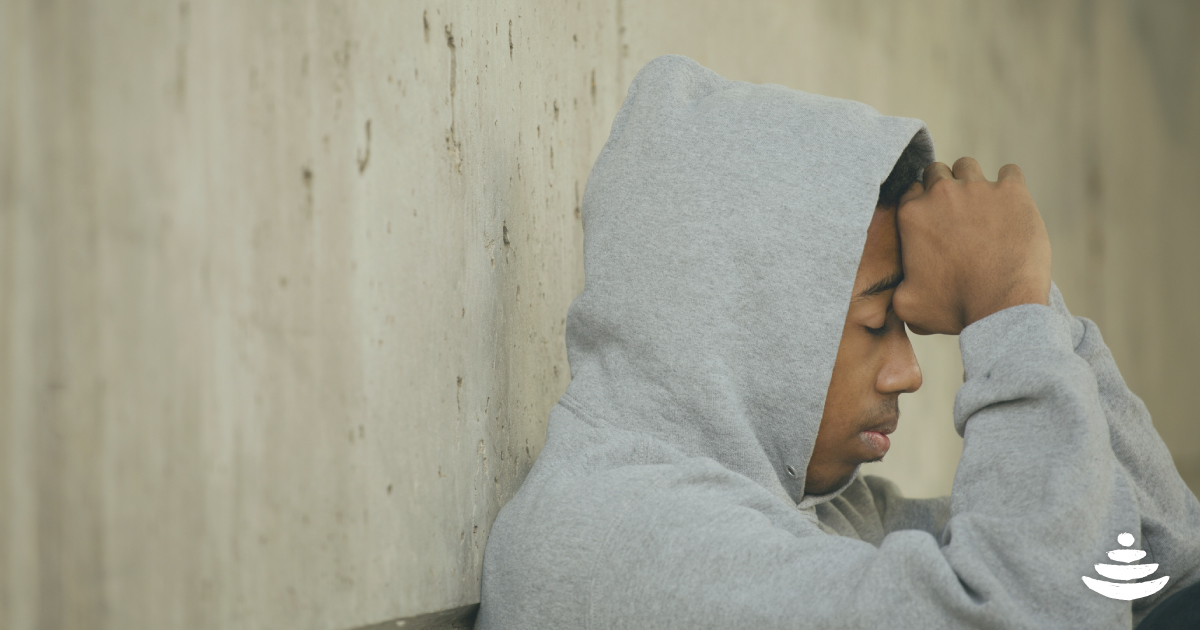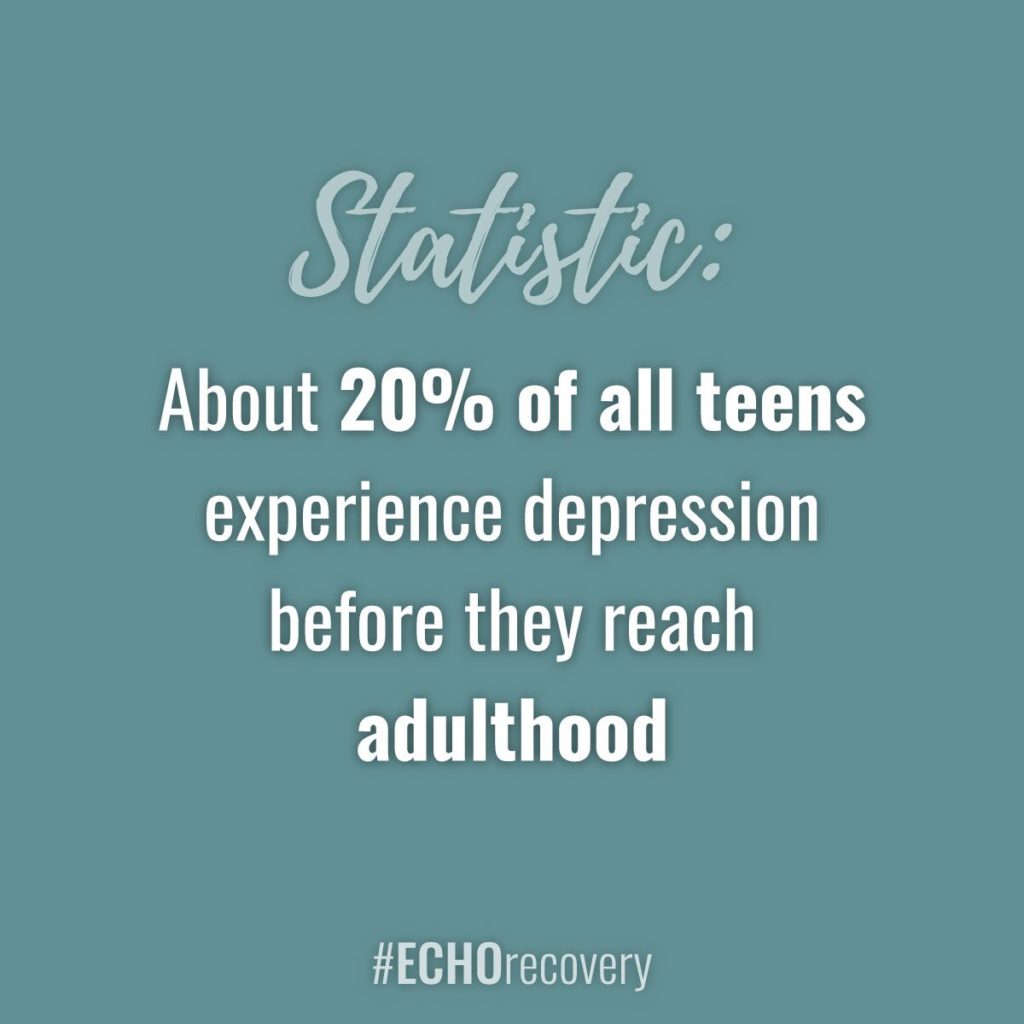Suicide is a major issue in the United States, and one of the leading causes of death among young adults. According to the National Institute of Mental Health, suicide was the tenth leading cause of death in the United States overall and the second leading cause of death among people between the ages of 10 and 34 in 2016. Approximately 45,000 people died from suicide in 2016 within the United States. Certain risk factors exacerbate suicidal thoughts and ideation among young people – and depression and addiction are at the top of the list.
Major Risk Factors For Suicidal Ideation
 When someone makes the decision to commit suicide, they do not do so at random. Years of trauma can contribute to suicidal ideation, as well as abusing drugs and alcohol. Feelings of extreme sadness, pain, and trauma often push a person to take this action, much to the grief of their friends and family. While many people may think about suicide throughout their lives, certain risk factors and occurrences can increase someone’s chance of committing suicide.
When someone makes the decision to commit suicide, they do not do so at random. Years of trauma can contribute to suicidal ideation, as well as abusing drugs and alcohol. Feelings of extreme sadness, pain, and trauma often push a person to take this action, much to the grief of their friends and family. While many people may think about suicide throughout their lives, certain risk factors and occurrences can increase someone’s chance of committing suicide.
Substance abuse is a major risk factor for suicide, especially if the person is also experiencing other mental disorders such as:
- Major depressive disorder
- Post-traumatic stress disorder
- Anxiety disorders
- Other personality disorders
In addition, stressful life events can push someone into committing suicide. Poor social support, loneliness, isolation, and feelings of hopelessness also increase a person’s risk of suicide. In addition, a history of childhood abuse, chronic pain, and prior suicidal behavior are risk factors for suicidal ideation. Feelings of aggression and impulsivity can lead others to act upon their suicidal thoughts.
Substance abuse can seriously impact a person’s life, leading to the stressful life events and feelings of isolation and loneliness that can exacerbate suicidal ideation. Relationships can crumble and people who suffer from addiction can isolate themselves from other people in order to use drugs and alcohol. Addiction can also increase instances of aggression, impulsive decisions, and chronic pain. Many people use drugs and alcohol to cope from traumatizing events in their past – making them susceptible to suicide.
How To Identify Suicide Warning Signs
Suicidal ideation does not exist in a bubble, especially if someone you know is suffering from drug and alcohol addiction. Each person who experiences suicidal ideation will express their feelings in a different way. Some people may exhibit no warning signs at all, while others will show some of the classic signs of suicide.
However, if you notice that someone you love is exhibiting any of the following warning signs of suicide, you should not ignore them.
- Exhibiting extremely anxious or agitated behavior
- Using heavy amounts of alcohol and drugs
- Avoiding social situations
- Isolating themselves from friends and family
- Not participating in hobbies and other activities that they previously enjoyed
- Expressing a desire to die or an interest in death
- Engaging in reckless, dangerous behavior
- Engaging in self-deprecating and self-critical talk
- Suffering from insomnia
- Exhibiting extreme irritability
- A sudden, sharp decrease in their work and academic performance
- Suddenly giving away personal and sentimental belongings
- Evidence of self-harm on their body, such as cuts or burn marks
How To Help Someone Who Is Addicted And Suicidal
Helping someone who is struggling from addiction, depression, and suicidal ideation is not an easy task. Offering to help them seek treatment may feel like an attack or confrontation, while leaving them alone could increase their feelings of isolation. The best way to approach someone who is suffering from suicidal ideation and addiction is in a calm, measured, and prepared manner.
Pay attention to the warning signs that make you think they may be thinking about suicide. What is different about their behavior, actions, and overall persona? Has there been a sudden change after a traumatic event, or have you seen them gradually get worse over time? Knowing the reasons why you want to help them will aid you in your approach.
Approach your loved one calmly and with a great deal of care. Tell them that you are there for them, and they can tell you about whatever is on their mind. When someone is struggling with suicidal thoughts and addiction, they can feel trapped in their own thoughts and fall away from reality. By expressing their thoughts and feelings to you, they can bring themselves closer to reality. In addition, knowing exactly what is on their mind can help you make better decisions on how to help them. Remind your loved one that their life matters, that you care about them, and you want to help.
Offer to help your loved one contact a professional and seek psychiatric treatment. They may refuse to seek treatment for a number of reasons, including guilt, shame, and embarrassment. If you believe they need treatment, contact the professionals on their behalf. Accompany your loved one to the hospital and any treatment programs they may attend, and spend time with them. By establishing yourself as a consistent presence in their life, you can become a source of strength and someone to rely on – which a person who is struggling with addiction and suicidal thoughts needs to survive.
Seek Help For Addiction Today
Although addiction and depression can exacerbate suicidal thoughts and actions, help is available. Certain protective factors can reduce suicidal ideation in people struggling from addiction, and the first step is to seek professional help through a drug and alcohol treatment program. The following factors can reduce suicidal ideation in young adults struggling with addiction:
- Being clean and sober from drugs and alcohol
- Attending regular substance abuse support groups, such as Alcoholics Anonymous and other 12-step programs
- Receiving mental health care from a trusted counselor, therapist, or psychiatrist
- Identifying reasons for living
- Believing in a higher power and adopting spiritual beliefs
- Having stable relationships and responsibilities, such as employment and parenthood
You can achieve many of these protective factors by attending a drug and alcohol treatment program. If you are struggling with addiction anywhere in the United States, you are not alone. This issue impacts millions of people across the country. Help is available to aid you in reducing your dependency on the substance, manage withdrawal symptoms, and begin the path to recovery.
Seek treatment at a professional drug and alcohol rehabilitation facility as soon as possible. For additional resources on managing addiction and recovery, visit Echo Recovery today.

Experienced Chief Executive Addiction Recovery and Mental Health Professional
Business professional in the Addiction Recovery and Mental Health industry for the past 26 years. Caring, compassionate and strongly motivated to make a difference in the organizations I am affiliated with and welfare of the population we serve. Currently focused on advocating, educating and developing projects leveraging evidence based, real time technology to support individuals in recovery.


 According to the
According to the 
 Because of the increased rates of depression and anxiety among today’s youth, our young people are more at risk of self-medicating and addiction than ever. More and more addiction treatment centers are offering programs focused on addressing anxiety in adolescents and young millennials to meet the needs of our current climate.
Because of the increased rates of depression and anxiety among today’s youth, our young people are more at risk of self-medicating and addiction than ever. More and more addiction treatment centers are offering programs focused on addressing anxiety in adolescents and young millennials to meet the needs of our current climate.
